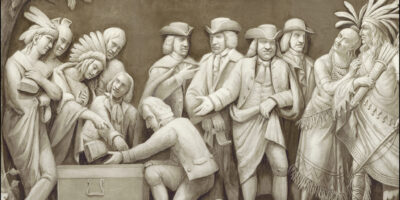The Prosperity Around You Is the Fruit of the Enlightenment

“All that we are is the result of what we have thought.” ~ fortune cookie, July 25, 2019
Last week, I explained that the past is a nice place to visit but you wouldn’t want to live there. But what explains the big differences between then, when life for virtually anyone was solitary, poor, nasty, brutish, and short, and now, when life is growing more and more connected, wealthy, clean, peaceful, and long for more and more people?
There are a lot of explanations for what Jonah Goldberg calls “the miracle” of modern, liberal, democratic, capitalist peace and prosperity in his book The Suicide of the West. As Deirdre McCloskey shows in her 2010 book Bourgeois Dignity and her 2016 book Bourgeois Equality, most of the explanations don’t do the full explanatory work.
Railroads and transportation improvements, for example, might account for a few percentage points of the difference between standards of living then and standards of living now, but they don’t get us anywhere close to understanding the tenfold to hundredfold increase in standards of living we really want to be able to explain.
If it wasn’t material factors like railroads and high savings rates, might it have been property rights and good institutions? Here I depart from McCloskey in that I think institutions and institutional changes are probably more important than she gives them credit for in her 2010 and 2016 books, but she’s largely right that the timing and geography, for the most part, don’t work very well (we summarize some of her argument about what she has termed “The Bourgeois Deal” in this 2018 paper for the Fraser Institute).
The rule of law goes back to Hammurabi, and British property rights were as secure and well-enforced in the 13th century as they were in the 18th. The way McCloskey explains it, good institutions that protect property rights are necessary but not sufficient for the Great Enrichment of the last three centuries.
So what explains it? McCloskey emphasizes an intellectual change and, specifically, a widespread embrace of innovation that had been missing previously. So does Northwestern University’s Joel Mokyr — particularly in his 2009 book The Enlightened Economy: An Economic History of Britain, 1700-1850 and his 2016 book A Culture of Growth: The Origins of the Modern Economy. In The Enlightened Economy, Mokyr emphasizes what he called “the Industrial Enlightenment.”
In A Culture of Growth, he expands on this theme more generally and argues that economic progress had at its roots an ideological change especially among European intellectual and moral elites who were united by a common elite language (Latin), bound together by falling postal costs, and protected (at least somewhat) by a politically fragmented Europe in which lords and nobles and rulers courted intellectuals they might have wished to retain as advisors and tutors.
Europe’s political fragmentation meant that the rulers were playing whack-a-mole with heretics and critics. A noble might try to suppress the wicked ideas of one thinker only to see him pop up a few principalities over under the protection of a different noble. It wasn’t exactly an environment that was safe for heterodoxy, but it was safe enough that we could get an Enlightenment.
As Mokyr argues, these intellectual and cultural elites came to embrace the idea that progress is possible as well as the idea that progress is desirable. The Industrial Revolution, therefore, was the outgrowth of these ideas, which were in turn the product of a “Republic of Letters” uniting — or at least facilitating conversation between — thinkers scattered across a politically fragmented Europe. It certainly wasn’t that European rulers didn’t try to suppress the free flow of ideas. They were just a lot less successful than rulers in other parts of the world.
If you look around you, you see the fruits of the Enlightenment. “What we have thought” is obviously embodied in our intellectual and spiritual reality, but it is also embodied in our material reality. The computer on which I’m typing isn’t valuable because of its chemical and material composition. It’s valuable because it embodies a bewildering array of ideas — things people have thought. The computer made it from a factory to my desk because of what people thought about steel, vulcanized rubber, glass, and internal combustion. As I argue in this chapter in The Cambridge Handbook of Classical Liberal Thought — a version of which you can download for $0 here — an object only becomes a resource when it is infused with thought.
In other words, something is only a resource if we have figured out how to use it to satisfy our wants. Until they were transformed by thought, minerals and oil were just so much dirt and goo.










